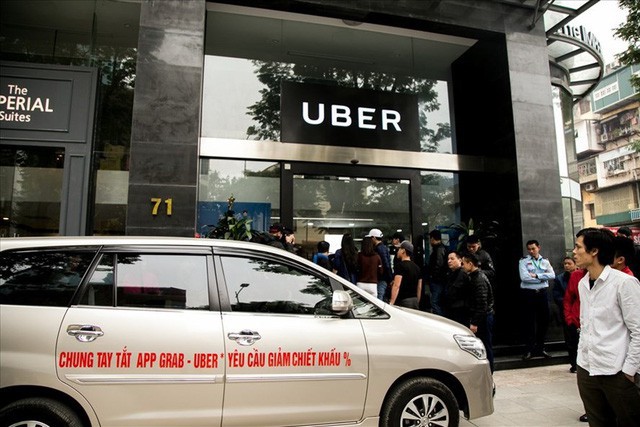Grab and Uber drivers’ honeymoon finds bitter end
 |
| Uber and Grab drivers are becoming disillusioned with the companies |
Crushed dreams of a simple job with high income
According to Nguyen Nam from Hanoi's Hoang Mai District, he started working for Uber one year ago, when the ride-hailing models of Uber and Grab were enjoying fast development.
Uber and Grab issued numerous attractive incentives to lure in drivers. Thus, he decided to buy a car for VND600 million ($26,420), VND500 million ($22,017) of which came from a four-year bank loan.
At first, by enjoying numerous incentives, Nam earned an income of VND27-30 million ($1,188-1,321) per month, excluding the expenditure of petroleum and commission. According to his calculations, after four years of working for Uber, he would be able to pay off the bank debt and start earning massive profit.
However, his dream broke when Uber cut a number of allowances and increased commission. In addition, the fast increasing number of drivers gave rise to discontent. As a result, Nam decided to sell his car and change his job.
Along with taxi drivers, GrabBike drivers and Uber moto drivers also face similar challenges. Do Hoang from Phu Tho province stated that at the beginning, he earned VND500-600,000 ($22.02-26.42) per day, including expenses for commission and petroleum, however, recently, his income has plunged due to decreasing allowances and increasing commission as well as the increase of moto drivers.
Drivers switching off the app in protest
Since January 1, both Grab and Uber increased their revenue shares from motorcycle and taxi drivers, creating a wave of protests from drivers.
Drivers of both Grab and Uber gathered in front of the companies and offices to ask the board of directors to issue a satisfactory explanation. Numerous drivers either switched off or deleted the ride-hailing app.
Nguyen Trung Thanh, managing director of GrabBike Vietnam, affirmed that the further deduction of 3.6 per cent in drivers' commission is to pay for drivers' personal income tax, pursuant to local authorities’ new directions on personal income tax effective since January 1, 2018.
However, GrabBike drivers are not satisfied by the company’s answer and continue to protest. As a result, Grab silently set revenue share back to 20 per cent without notifying drivers. The added revenue which Grab collected from drivers would be paid back before January 17.
Uber, on the other hand, kept silent and closed the doors of its office. However, Uber invited three drivers and police staff to the office for discussions. However, to date, no information about the discussion has been published.
Numerous Uber drivers warned that if Uber cannot issue a satisfactory explanation or decrease the commission, drivers will work for Vietnamese technology transportation firms.
Tilted playing field
Grab and Uber consider drivers as partners, not staff. However, in reality, the relationship is not much different than the one between employers and employees. Notably, almost none of the drivers were consulted about the increase. Uber and Grab always hold the advantage.
According to Bui Danh Lien, deputy chairman of the Hanoi Transport Association, Uber and Grab’s operations showed numerous issues during the pilot scheme for ride-hailing services, leading to conflicts with drivers.
The “transportation model using ride-hailing applications” is considered a model of “sharing economy.” Sharing economy is a term that describes a mode of exchange, sharing of property and services between individuals, through a third party which is a technology application company. This model makes the most of the abundant resources in the society, based on the lease or exchange of assets between owners and those who wish to use them.
However, with the current operations of the car call model in Vietnam, according to some opinions, this form has lost the nature of pure sharing.
| Since January 1, GrabBike issued a new hike in commissions to 23.6 per cent from the previous 20. Meanwhile, Uber’s revenue share in Uber taxi drivers’ income increased to 29.5 per cent, including the commission of 25 per cent and the addition of 4.5 per cent for personal income tax. All drivers of the two brands complained that the commissions are too high, impacting their income. Additionally, numerous drivers intend to give up their jobs. |
What the stars mean:
★ Poor ★ ★ Promising ★★★ Good ★★★★ Very good ★★★★★ Exceptional
Themes: Ride-hailing services
Latest News
More News
- Temporary relief for food imports as businesses urge overhaul of regulations (February 07, 2026 | 09:00)
- Opella and Long Chau join forces to enhance digestive and bone health (February 06, 2026 | 18:00)
- Vietnam-South Africa strategic partnership boosts business links (February 06, 2026 | 13:28)
- Sun PhuQuoc Airways secures AJW Group support for fleet operations (February 06, 2026 | 13:23)
- Pegasus Tech Ventures steps up Vietnam focus (February 05, 2026 | 17:25)
- The generics industry: unlocking new growth drivers (February 04, 2026 | 17:39)
- Vietnam ready to increase purchases of US goods (February 04, 2026 | 15:55)
- Steel industry faces challenges in 2026 (February 03, 2026 | 17:20)
- State corporations poised to drive 2026 growth (February 03, 2026 | 13:58)
- Why high-tech talent will define Vietnam’s growth (February 02, 2026 | 10:47)
















 Mobile Version
Mobile Version